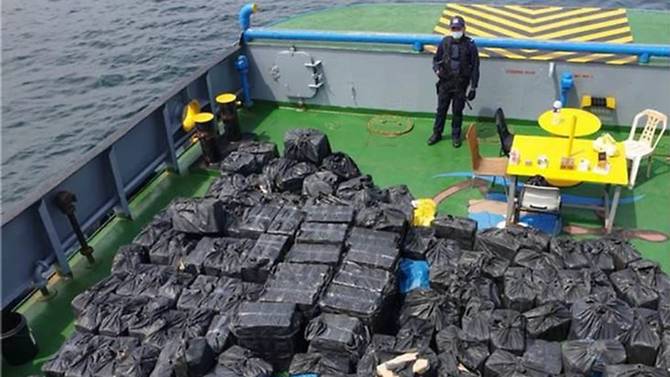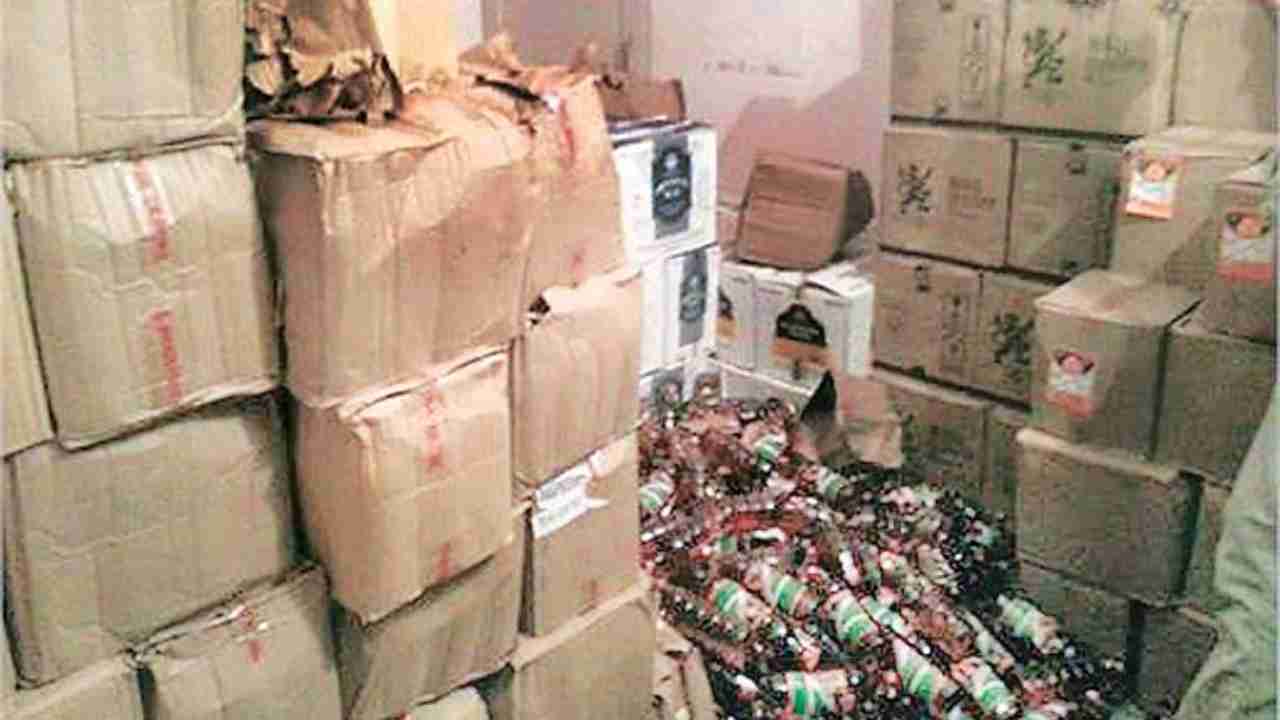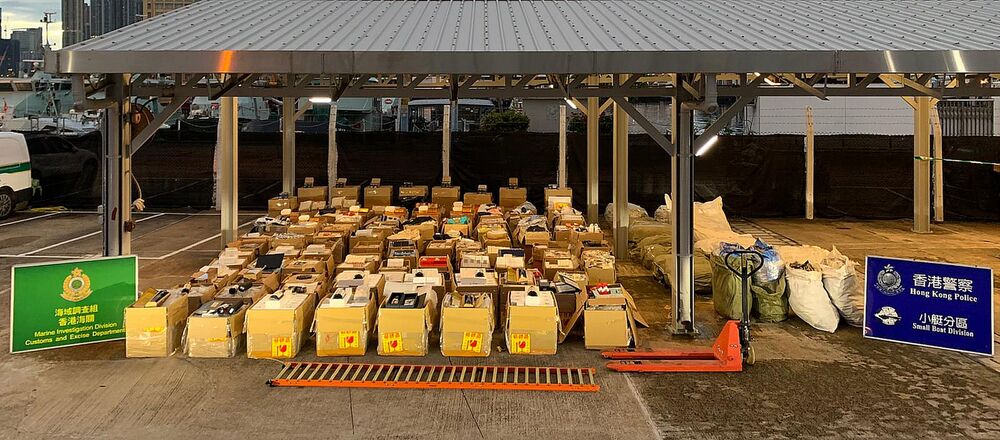
8 arrested for smuggling contraband cigarettes into Singapore on tugboat
SINGAPORE: Eight men were arrested for smuggling 3,490 cartons of contraband cigarettes into Singapore on a tugboat, said the Singapore Police Force on Thursday (Aug 13).
The men, Indonesian nationals aged between 24 and 53, were detained during an operation conducted by the Police Coast Guard and the Immigration and Checkpoints Authority (ICA) at the Western Anchorage on Tuesday.
“During the enforcement operation targeting illegal activities in Singapore waters, a total of 3,490 cartons of duty-unpaid cigarettes were discovered inside the tugboat,” the police said in a news release.
The cigarettes were seized as case exhibits, the police said, adding that the duty evaded amounted to S$433,430 while the Goods and Services Tax (GST) was S$33,020.
Lear MoreTirupati: To overcome Corona crisis, cab drivers turn liquor smugglers
Tirupati: Months of unemployment has forced many cab drivers into bootlegging in the district. With no income due to lockdown and restrictions, many travel vehicle drivers have turned to smuggling non-duty paid (NDP) liquor from Karnataka. Statistics of raids and seizures effected by Special Enforcement Bureau in the last few months reveal that 22 out of the 46 liquor smugglers caught in the act in the district were travel vehicle or cab drivers.
Huge difference in the price of liquor in Andhra Pradesh and Karnataka means earning considerable profit to maintain their families in these hard times. According to sources, have turned to smuggling liquor from Karnataka as it is just across the border from Chittoor district. The AP government has increased the prices of cheap liquor abnormally, purportedly to wean away addicts from the booze as part of its ‘phased’ prohibition. While a quarter bottle of Indian Made Foreign Liquor (IMFL) sells at Rs 180 in our state, it is around Rs 80 in the neighbouring states.
Lear MoreCounterfeit Realme products worth Rs20 lakh seized from Gaffar Market
New Delhi: Realme smartphone accessories amounting to approximately Rs 20 lakh were seized by the local police during a raid on two shops in Delhi’s Gaffar Market on August 9, the Chinese smartphone maker said.
Over 3,800 counterfeit Realme products were seized during the raid after Realme raised a complaint with the local police. The confiscated goods include earphones, USB cables, power adapters, and batteries.
The local police arrested two accused during the raid and they were released on bail. Realme said that it plans to conduct more raids soon to combat counterfeit goods issue.
Lear MoreU.S. Customs and Border Protection seize $83k worth of counterfeit designer products
The U.S. Customs and Border Protection Agency along with the Port of New Orleans announced Monday that they seized $83,000 worth of counterfeit designer products.
Officers seized counterfeit Louis Vuitton and Mac products on Thursday from an express consignment facility.
Officers found 75 Gucci and Hermes belts, as well as Louis Vuitton duffle bags, backpacks, wallets, and purses, and 10 Mac brush kits. All of the items were seized pursuant to 19 USC 1526e for bearing the counterfeit trademarks, according to a news release issued by U.S. Customs.
“Even through challenging times, our officers continue to protect consumers and jobs by intercepting and seizing fraudulent goods,” said CBP Port of New Orleans Director Terri Edwards. “It’s a shame that there are people out there using this time to traffic illegitimate merchandise, but we commend our officers for protecting American consumers from these fraudulent purchases.”
Lear More
Chinese woman illegally crossed Canada-U.S. border with $38K in gold bars: authorities
TORONTO — A Chinese woman was arrested after allegedly entering the United States illegally from Canada while carrying more than $38,000 in gold bars, according to border authorities.
U.S. Customs and Border Protection said in a statement released Thursday that the woman was arrested with 14.25 ounces of gold bars in her possession, valued at over $38,000 (US$28,500). She also had more than $13,500 (US$10,000) in cash.
The 36-year-old woman was apprehended near the town of Amity, Maine on Tuesday, the agency said in the statement.
Officials said the woman admitted to being a Chinese national illegally present in the U.S. The woman told border authorities that she had been legally allowed into Canada as a student and illegally crossed the border to visit a friend in San Francisco, Calif.
Border officials from the Houlton Border Patrol Station determined the spot where the woman illegally crossed the Canada-U.S. border by matching footprints with her shoes, according to the statement.
Lear MoreFake Apple items worth Rs 13.8L seized
4 stores in Geeta Mandir found selling these as original after pasting stickers.
Officials of the Prevention of Crime Branch (PCB) raided four shops in the mobile market at Geeta Mandir and seized a huge consignment of duplicate products of Apple brand worth around Rs 13.8 lakh.
The team was on patrol in Geeta Mandir area on Friday when they received a tip-off about sale of duplicate products of the brand at four mobile phone shops in the area. They went and raided the stores— Core Telecom, Parmeshwari Mobile Accessories, Shree Nagnechi Mobile Accessories and Bhavani Mobile Accessories.
They found that duplicate products being sold as original after pasting stickers of the brand. Subsequently, the store owners were booked under relevant sections of IPC and under the Copyright Act by Kagadapith police.
Lear More
Rajasthan: Liquor smuggled in name of Ayurvedic medicine, busted
Rajasthan’s Sikar Udyog Nagar police officials on Thursday have nabbed a truck driver and his comrade involved in liquor smuggling. The truck driver has been identified as Sukhwinder Singh and his associate has been identified as Baljinder.
As per the reports, the Ayurvedic medicine, that was being sent from Sikar to Assam via a truck, was allegedly stolen by the truck driver and his associate. Both started smuggling liquor from Haryana to Gujarat and other places by filling liquor under Shankhpushpi, a traditional herbal Ayurvedic medicine.
Police head, Pawan Chaubey said that Ved Prakash Agarwal, a resident of Anand Nagar area of the city has a firm called ‘Avinash Sales’. His firm works to supply the raw material of Ayurvedic medicine. His firm had sent a consignment of Shankhapushpi worth Rs 4 lakh on June 14 via Agarwal Transport Company at Sirsa in Haryana to Balipara, Gaurimari, Sonipura(Assam) for Dabur India Company.
Sixty thousand rupees were already paid for its transportation from Sikar. On June 23, when the medicine did not reach Assam, Prakash approached the transport office, Chaubey added.
https://newsd.in/rajasthan-liquor-smuggled-in-name-of-ayurvedic-medicine-busted/
Lear MoreBSF seizes silver ornaments at India-Bangladesh border
The Border Security Force (BSF) seized silver ornaments from a bike while it was being smuggled to Bangladesh in West Bengal’s Kaijuri, BSF South Bengal said. According to the force, the incident occurred on August 6 when ornaments worth Rs 9,60,720 were seized while they were being smuggled on a bike.
A smuggler on a motorbike was approaching the border on Thursday night when BSF troops chased the bikes and stopped it. The smuggler then left the bike and fled. The troops opened the toolbox and found 13 kg of silver jewelery. The bike was also confiscated while the border guards are trying to find out the identity of the motorbike with the number plate.
Lear More
Nine custom-order smugglers nabbed
Customs and marine police officers have cracked a smuggling case in north Lantau, seizing HK$18 million worth of luxury products, including dried seafood, wine, designer clothes, cosmetic products and cigars.
Danny Cheung Kwok-yin, divisional commander of the customs and excise department’s marine investigation, said travel curbs for mainlanders gave smugglers extra incentive to step up their runs at this time.
“It is believed some individuals took the orders of mainland customers online and then smuggled in the goods,” he said.
Nine local men were arrested in the operation involving officers from customs’ marine enforcement and the marine police’s regional task force, small boat division and west division on Monday.
Ip Hau-foon, senior inspector of the marine police’s regional task force, said the arrests were made when the nine were unloading goods from a lorry onto a speedboat near the airport.
Officers first spotted the speedboat in the waters off the southeast of the airport at 9pm on Monday, which later sped toward the rocky shore near the Sham Shui Kok Chlorine Unloading Area.
https://www.thestandard.com.hk/section-news/section/4/221623/Nine-custom-order-smugglers-nabbed
Lear MoreChennai: Passengers smuggle gold via relief flights; 2.21Kg gold seized
In three instances of Gold smuggling at the Chennai International Airport since the nationwide lockdown was imposed in March, Air Customs officials have seized a total of 2.21 Kg gold under Customs Act 1962. The yellow metal was smuggled in by passengers who had entered via relief flights operated from the West-Asian nations.
On Tuesday night, Kasimani Kolanji, (22) and Murugan Chandran,(38) of Thanjavur, Tamil Nadu arrived from Dubai by Air India Express Airlines Flight No. IX-1644. They were intercepted by Air Intelligence Unit officers at exit on suspicion of carrying gold. On their personal search, four polythene pouches(two each) containing gold paste were found concealed inside the waistline/belt portion of their jeans. On extraction by heat treatment, 731 grams of gold of 24K purity valued at Rs. 34.5 lakhs was recovered and seized.
On Tuesday morning, Khaleel Ahamed, 24, who arrived from Dubai by Air India express flight IX-1644 was intercepted at exit. On frisking, a packet of gold paste was found to be concealed in his innerwear. On extraction 280 grams of gold valued at Rs.15.60 lakhs was recovered and seized.
Lear More


